Five faculty have received Creative Teaching Awards for 2023.
The Creative Teaching Awards recognize UGA faculty for excellence in developing and implementing creative teaching methods to improve student learning. These awards are presented annually on behalf of the Office of Instruction to faculty who have demonstrated either the use of innovative technology or pedagogy that extends learning beyond the traditional classroom or creative implementation of subject matter that has significantly improved student learning outcomes.
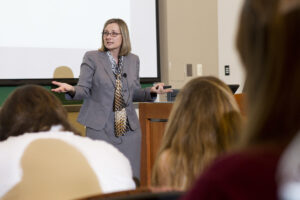
Audrey Haynes
Political Science
School of Public and International Affairs
Audrey Haynes, associate professor of political science with the School of Public and International Affairs, is setting students up for success through her course, “Introduction to Applied Politics.” Students learn about political agenda setting, political communication, and campaigns. Guests who work in the field visit the class to share practical wisdom and serve as mentors. Haynes uses “engagement points” to reinforce active and experiential learning as students are rewarded for interactions with the professor and the visiting guests; participating in events outside of class; independent learning; and independent interactions with the guests, such as connecting with them on LinkedIn, sending thank you notes. This strategy primes students to think about their own active participation in the course and to recognize that learning outcomes depend on their own level of involvement.
Students who are inspired by her teaching and who have gone on to inspire others are now among a new generation of political and civic leaders in the state of Georgia and beyond. Indeed, the course’s success can be seen post-graduation, with students who have completed POLS 5030 now working in the Georgia State House, lobbying, policy and budget analysis, gubernatorial campaigns, and as political advisors.
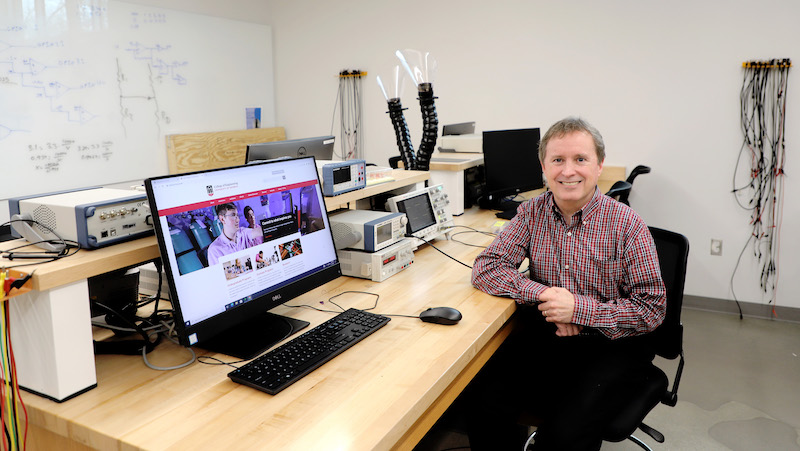
Chris Herring
Electrical and Computer Engineering
College of Engineering
Chris Herring, a lecturer in the School of Electrical and Computer Engineering in the College of Engineering, provides his students with a “mini-internship” experience in his “Computer Architecture” course. Herring’s students work together in design teams to complete projects that evolve as students collaborate and learn new concepts. Herring acts as project manager keeping students on track while students work to find the path to the solution. Students can have multiple roles in the project and serve as both mentors and mentees. And every iteration of the class builds on the previous class as student work will be used in the next year’s version of the course. Students are rewarded for creating productivity enhancements not envisioned by the project and for finding and correcting errors in any course or project materials.
The class uses well-known industry tools and practices so that students can envision themselves in their role in industry, thereby relating classroom instruction and projects to future jobs.
In course evaluations, one student said: “The class allowed me to discuss and get closer with peers, get more ideas and become more flexible with those thoughts and ideas.”
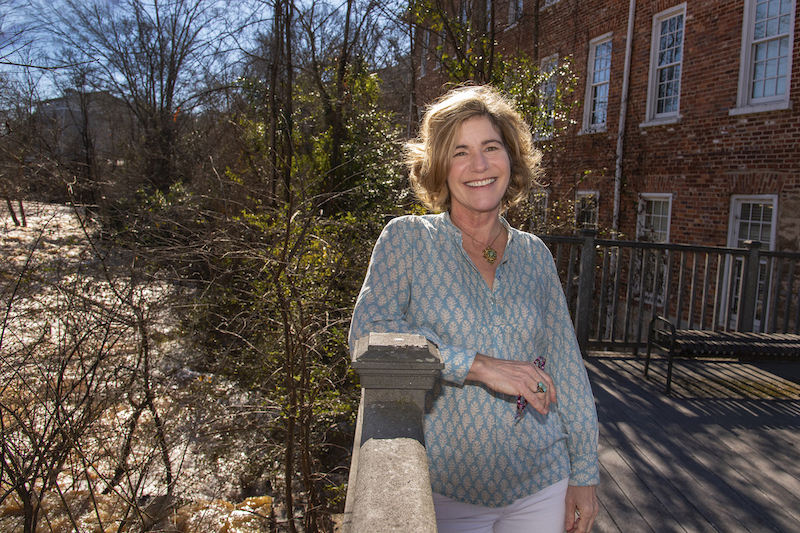
Jane McPherson
School of Social Work
Jane McPherson, an associate professor in the School of Social Work, immerses her students in the complex history of social work in Athens in her course, “Complex Cloth.” She works with graduate students to explore the social reform efforts of the antebellum fabric mill, the historic building the School of Social Work now occupies. The mill once used a mixture of enslaved and free labor, including child labor. McPherson created this interactive project to promote reflection about social justice, and how accepted practices may be simultaneously legal and unjust.
A highlight of SOWK 7500, a capstone in the Master of Social Work program, is visiting the Special Collections Library where students get hands-on opportunities to interact with historic objects. One student commented: “Understanding and conceptualizing historical artifacts from Athens, Georgia, and its connection to the social work field assisted me in guiding my purpose as a social worker…engaging with artifacts and documents provided me with a physical connection to community…I think it is important all social work students see and engage in this history.”
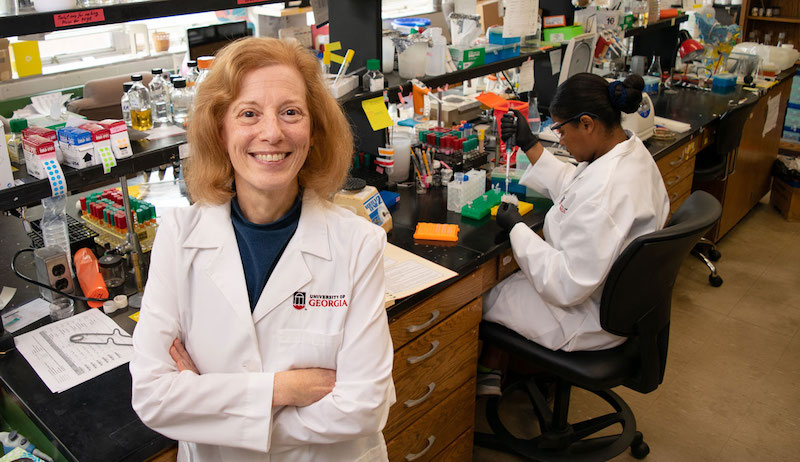
Ellen Neidle
Microbiology
Franklin College of Arts and Sciences
Ellen Neidle, a professor in the department of Microbiology in the Franklin College of Arts and Sciences, teaches the thrill of true experimental discovery. She developed her “Experimental Microbiology” lab using active learning to inspire her students to test new hypotheses toward solving complex issues.
Rather than teaching experiments with known outcomes, Neidle involves her students in authentic research projects and includes them in the entire process of experimental design, implementation, and analysis. The goal is to motivate creativity, instill curiosity, build confidence, and foster independent thinking. Students learn cutting-edge molecular biology techniques and read current literature. Neidle encourages her students to keep accurate, meticulous records, and her students’ work has contributed to publications in peer-reviewed journals. The emphasis on publication helps students understand the value of their contributions, and critical communications skills develop naturally. At the end of the course, students give final presentations to a small group of faculty members. One student commented that Dr. Neidle “molded this course into something amazing, and to me, a life-changing experience. In the course, I was able to do real experiments and contribute towards something significant in the greater world.”
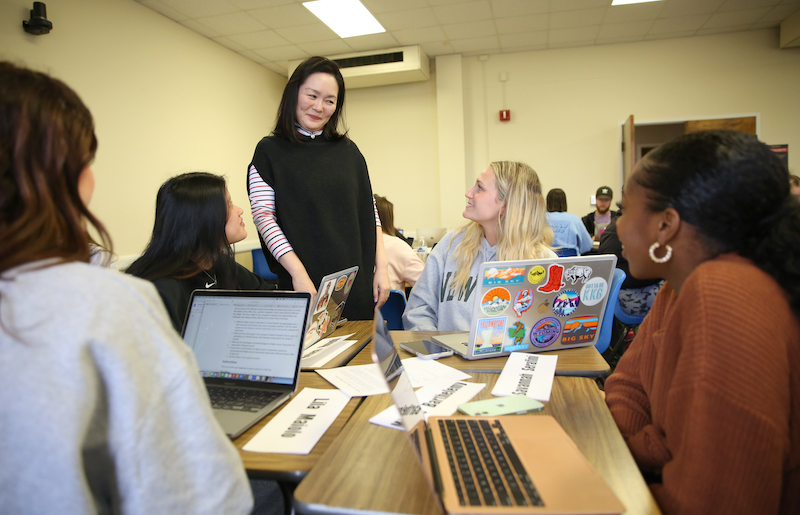
Yoo-Kyoung Seock
Textiles, Merchandising and Interiors
College of Family and Consumer Sciences
Research, design, technology, and branding are all intertwined in “UX/UI Design Applications in Fashion Branding,” taught by Yoo-KyoungSeock, a professor in the department of Textiles, Merchandising and Interiors in the College of Family and Consumer Sciences. This class provides students with hands-on, industry-partnered learning experience that integrates data analysis, user experience research, and design thinking skills.
The class partners with Carter’s, Inc., an Atlanta-based children’s clothing company. Students look at revamping the company’s app interface with a focus on user-centered design and creating user-centered solutions. An eye-tracking was developed by the faculty instructor and a Ph.D. student for this class. Carter’s current UX designer provides feedback to students while completing the project. The eye-tracking app had a heat map and gaze point analysis to analyze app interfaces to help students to understand the importance of data visualization and analysis in the field of app development. By working with industry professionals and analyzing authentic data and using eye-tracking technology, Seock’s students get a unique and innovative learning experience that is not currently available in other fashion merchandising programs or similar programs. Seock’s class also helps her students build their portfolios and confidence toward a career in the fashion industry.
